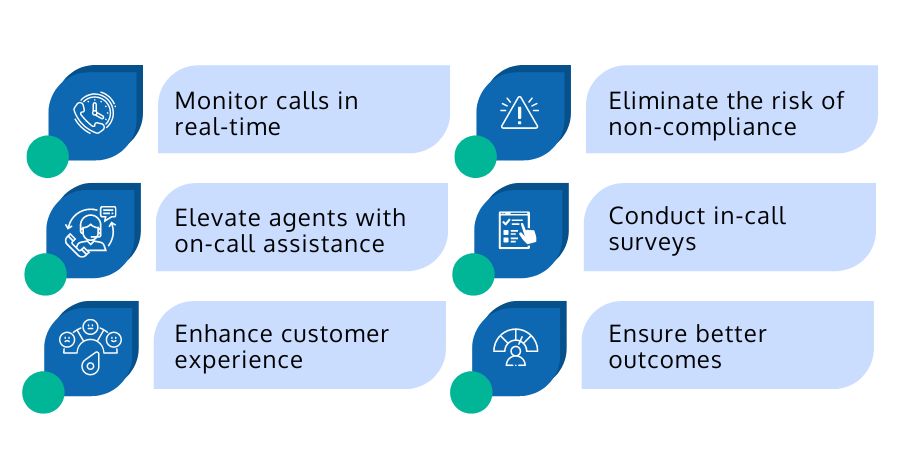
The customer is king. You must have heard this phrase. As an enterprise applying this principle to your business is crucial. Especially when you have a large client base, to deal with this problem, enterprises started using data.
Talking about a large customer base, call centers face them day in and day out. Data for them is the conversations that they have with their customers. Real-time analytics of this data helps them achieve higher customer satisfaction.
You must have noticed that customer service technology has evolved dramatically. They are more sophisticated and accurate than before. Call analytics have helped businesses provide better customer experience at a lower cost.
In this article, we will understand real-time call analytics and how it can improve the productivity of your business while maintaining customer satisfaction.
What is Real-time Call Analytics?
Real-time call analytics is a powerful tool used for customer service. It uses Natural Language Processing (NLP) and Artificial Intelligence (AI) to track customer interactions. After analyzing the information, it recommends suitable actions for agents during the call.
In addition, it enables agents to address customers’ needs appropriately to ensure a better experience. With the help of this data, businesses can evaluate how well an agent handles calls. Real-time call analytic tools also reveal hidden insights, such as customers’ emotions during the call, customer interaction across different channels, and more.
Why Do You Need Real-time Call Analytics?
Real-time call analytics analyzes information as soon as it is collected. It applies logic and mathematics to raw data. Real-time analytics is proactive and triggers responses.
Initially, businesses used post-call analytics tools which delivered reports after the call. At the same time, it provided insights to understand and improve the quality of future calls. It could not reduce the damage that may have happened over the current call.
However, with real-time analytical tools, you can monitor your ongoing calls. It comes in handy when agents encounter problems while in the middle of a conversation with a customer. It gives suggestions to improvise and eliminate or reduce any tough conversations. It also improves compliance while providing a birds-eye view to call center supervisors.
Amplify Profits with Real-time Call Analytics
Contact centers are actively implementing real-time call analytics due to their ability to capture, analyze and report. It helps organizations improve service quality and identify cost savings while optimizing their processes.

Let’s look at how real-time call analytics can enhance your profits:
Monitor Calls in Real-time
As basic as it might look, the benefits of continuous real-time monitoring of customer calls are invaluable. It tracks successful interactions by automatic assessment of calls. This enables managers to see specific difficulties contributing to poor agent performance.
Furthermore, it helps in detecting problematic callers. This includes angry or abusive customers complaining or asking for refunds. With the help of this technology, agents can quickly identify such callers, address their concerns, and prevent them from causing disruptions.
In addition, it helps to guide the sentiment of the conversation so you know if the call left a positive or negative impression on the customer.
Elevate Agents with On-call Assistance
Real-time analysis of customer calls can help boost agent performance. This feature assists agents by providing real-time suggestions. Training new agents becomes easier with the archive of recorded calls and transcriptions in one place. Also, the software offers on-call guidance so they can learn while on the job.
Even experienced agents can benefit from this technology. It lets them know if they're talking too fast. It triggers pop-ups to help them talk about different topics. It ensures agents adhere to the per-defined call etiquette.
Enhance Customer Experience
Customers feel satisfied when the agents can answer every call efficiently and solve queries quickly. The predictive ability of this technology enables agents to stay prepared for challenging scenarios and questions.
The most common complaint that customers have is the wait time. It happens due to the long queue. With real-time call analytics, call volumes, the number of calls in line, and the wait time for each call can be monitored and managed better.
Eliminate the Risk of Non-compliance
When customer calls are monitored continuously, there is little to no risk of non-compliance. Using real-time analysis of calls helps the team to focus on low-quality calls while improving the training process of new employees. The software analyzes each call and provides insights when needed, making the lives of agents and customers much more effortless. The call transcription feature allows managers to quickly read through the transcript without listening to the entire call.
Conduct In-call Surveys
Analyzing calls helps gather real-time customer feedback and improve customer experience accordingly. Also, it can help overcome gaps and establish a reliable method of measuring, reporting, and increasing customer satisfaction.
Additionally, it can help to identify and develop upsell and cross-sell possibilities according to customer demands.
Ensure Better Outcomes
The most crucial feature of real-time analysis tools is their ability to convert customer interactions into an archive of structured data. This data helps validate the results of CSAT and NPS surveys. It also compares data across the organization to analyze trends and patterns. Agents' metrics can be used to analyze their performance and help elevate their careers.
Improve Productivity with the Power of Data
If data is the main character, analytics tells its story. Customer journeys are becoming more complicated every day. Considering the number of calls, using a manual approach to tracking at a call center is no longer feasible.
Real-time call analytics can trace customer journeys. It uncovers information about agent availability and staffing needs. It allows managers to be proactive in managing day-to-day operations.
Integrating this technology into your organization will save you valuable time and resources. It can help fine-tune agents' productivity and improve call center performance.

 Batoi Corporate Office
Batoi Corporate Office